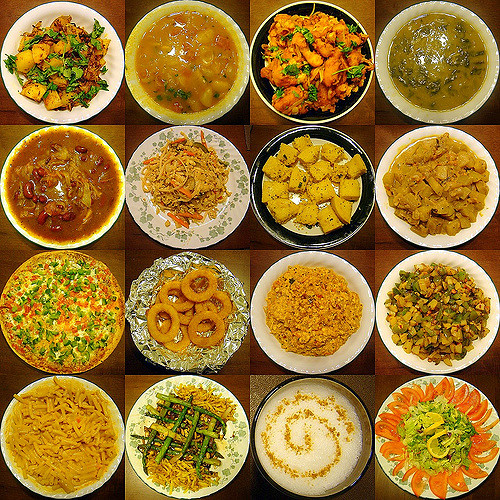By ena ganguly
Body positivity is a cultural push to include all types of bodies into visibility, inclusion, and mainstream culture. The push is a response to the overt fatphobia running rampant in all aspects of culture, not just in the states, but globally. What is fatphobia? Literally, it’s the irrational fear of fat people or fatness. In action, it’s shaming oneself or others for not looking skinny, working to be skinny, or not eating like a ‘skinny’ person, even though we know that there are skinny people who eat whatever they want and it has nothing to do with their weight. Fatphobia is a form of policing bodies so that we are trained to attempt unrealistic and violent beauty standards and to shame others for not doing the same. We police each other till it’s internalized, then we self-discipline and find others to police. The vicious cycle continues.
 In light of our fatphobic culture, body positive movements are necessary to bring positivity and joy to being big and fat. Sadly, the movement, as all movements, is often co-opted by white bodies, abled bodies, and the hourglass figure, but that needs to be undone to center, instead, differently abled, Black, Indigenous, Brown and fat bodies, preferably all of that together, please.
In light of our fatphobic culture, body positive movements are necessary to bring positivity and joy to being big and fat. Sadly, the movement, as all movements, is often co-opted by white bodies, abled bodies, and the hourglass figure, but that needs to be undone to center, instead, differently abled, Black, Indigenous, Brown and fat bodies, preferably all of that together, please.
It’s time that we create an internal shift in our QPOC culture where we celebrate all types of bodies, including fat bodies that do not fit into the hourglass mold. Here are some tips on doing that:

1. Don’t shame folks for their eating habits.
Food shaming is when someone, most of the time, a skinny person, condescends to bigger people about what they should or should not do to lead a ‘healthier’ lifestyle. There are so many layers to fat shaming, and one of them is to shame someone’s diet. Sometimes, people guise their fatphobia as concern for the ‘health’ of fat people to wonder why a fat person is eating so much or eating ‘unhealthily’. Health is relative. Don’t define other people’s health for them.
As a fat person, I’ve been shamed almost my entire life for my eating choices. By the well meaning relatives when I go to visit them in India (who are sometimes themselves fat!). The misogynist (fat) uncles at family parties in the states. The mean classmates in elementary and middle school. The shame was constant and so was the desire to control my body, my diet and my choices.
Like me, there are fat people who have always been fat, because NEWSFLASH, just like there are thin people who have always been thin, there are folks whose body type has always been fat. There are also folks who have hormonal struggles like Poly-Cystic Ovarian Syndrome or thyroid related issues, so losing, gaining and maintaining their body weight is a lot different for them than other folks. There are also those people who take medication that keeps them from losing weight, and even if folks want to lose weight, their journeys are their own, with its own hurdles, and you will never be in a position to determine that for others.
2. Support what fat people (want to) wear.
When your fat friend or relative want to show off their belly in a crop top, encourage them and let them know how good they look! Do a photoshoot to celebrate their jaw dropping fashion sense! Don’t start listing off all the things people will say or what other people will think. As a person who navigates a fatphobic world, you don’t think they know all that by now?
Most importantly, you need to actually believe that fat people should feel sexy in their skin, and that what they wear is on their terms and they can rock it however they choose. If you don’t feel that way, there are some internal shifts that need to happen. Try talking to your other skinny friends who are more fat-positive to see what their process looked like in unlearning fatphobia.
3. Push back against fatphobia.
Even if it’s in a casual conversation, if there’s a fatphobic comment or conversation being had, acknowledge it and let folks know that’s not okay. Do that work so that a fat person doesn’t have to.
If fat people are being self-degrading or fat degrading, hold space for them. Please don’t say, “You’re not fat. You’re beautiful.” because you are implying that fat can’t be beautiful. Simply listen to them, and if they are joking or being funny, smile along with them, but if they’re saying it seriously, silence can be your best friend. I say that because I know I don’t want a skinny person insisting that I’m beautiful or accepted by white hetero beauty standards, when I know better. I’ve experienced enough to know better. I don’t want a skinny person agreeing with me either. That’s messed up! If you feel close enough to that person and it’s something that’s weighing heavily on them, just ask, “What can I do for you?” and they will let you know on their own terms.
4. Be gentle on yourself and others
Fatphobia is not going away any time soon, so don’t put too much pressure on yourself or others to shift the culture overnight. Learn to listen to Black, Indigenous and Brown fat folks as they talk about their unique experiences navigating through institutions, personal, sexual and digital spaces, and position yourself in a way that you can support them when necessary. The work is always happening, and we will always need more QPOC folks to break the vicious cycle of fatphobia and move into body diversity.
I hope you picked up a few thoughts to marinate over, a tip or two to spread, and lots more appreciation and love for the QPOC fat people in your life. How do you deal with fatphobia or fatphobic people? What are some tips you want to offer? Share with us on Facebook, Twitter (@allgqpoc), and Instagram (@allgqpoc).

